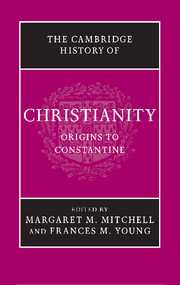Book contents
- Frontmatter
- Prelude: Jesus Christ, foundation of Christianity
- Part I The Political, Social and Religious Setting
- 1 Galilee and Judaea in the first century
- 2 The Jewish diaspora
- 3 The Roman empire
- Part II The Jesus Movements
- Part III Community Traditions and Self-Definition
- Part IV Regional Varieties of Christianity in the First Three Centuries
- Part V The Shaping of Christian Theology
- Part VI ‘Aliens’ become Citizens: towards Imperial Patronage
- Conclusion: retrospect and prospect
- Bibliographies
- Index
- Map 1. The Roman Empire in the time of Marcus Aurelius
- References
3 - The Roman empire
from Part I - The Political, Social and Religious Setting
Published online by Cambridge University Press: 28 March 2008
- Frontmatter
- Prelude: Jesus Christ, foundation of Christianity
- Part I The Political, Social and Religious Setting
- 1 Galilee and Judaea in the first century
- 2 The Jewish diaspora
- 3 The Roman empire
- Part II The Jesus Movements
- Part III Community Traditions and Self-Definition
- Part IV Regional Varieties of Christianity in the First Three Centuries
- Part V The Shaping of Christian Theology
- Part VI ‘Aliens’ become Citizens: towards Imperial Patronage
- Conclusion: retrospect and prospect
- Bibliographies
- Index
- Map 1. The Roman Empire in the time of Marcus Aurelius
- References
Summary
The imperium romanum and its subjects
The local and global impact of Roman power
The Roman empire forms the broader political, social and religious context for the emergence of early Christianity. Two developments are especially important for the situation we find in the first century ce. The first one, beginning perhaps in 229–228 bce with the first Illyrian war, is the successive conquest of the eastern part of the Mediterranean world by the Romans, who were able to capitalise on the spread of Hellenism to all of Asia Minor, Persia and Egypt in the wake of Alexander and his successors, the Diadochoi. Then, in the second half of the first century bce, the Roman republic was transformed into something new, retaining the name republic, but in fact now an autocracy of one man, who later took the eponymous title Caesar (Kaisar in Greek).
The beginnings: Caesar and Augustus. The path leading to Rome’s imperial history was set by Gaius Julius Caesar, who was assassinated in 44 bce by senators fearing that he was trying to become a new Roman king. His grand-nephew and adoptive son Octavian won the struggle for power with his decisive victory over Mark Antony at the battle of Actium in 31 bce. Warned by Caesar’s fate, Octavian avoided claiming for himself the title of king, but, owing largely to the military strengths of his legions which were strictly loyal to him, he now was without doubt Rome’s most powerful individual.
Keywords
- Type
- Chapter
- Information
- The Cambridge History of Christianity , pp. 69 - 84Publisher: Cambridge University PressPrint publication year: 2006

